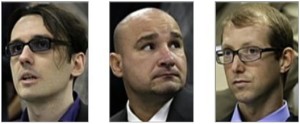
Case Overview
By Bruce Fischer
Steven Branch, Christopher Byers, and Michael Moore were brutally murdered in West Memphis, Arkansas. Their bodies were found naked and bound in a drainage ditch. All three victims were only eight years old at the time of their death. This was a shockingly gruesome attack on three innocent children.
Evidence indicated that Stevie and Michael were both beaten and drowned. Christopher’s death appeared to have been far more violent. He suffered violent injuries to his head and genital mutilation. Healed wounds were discovered during autopsy that suggested child abuse. Defensive wounds were found that had already healed along with fresh marks on his behind that appeared to have been inflicted with a belt.
Damien Echols, Jason Baldwin, and Jessie Misskelley have become known as the West Memphis Three. The three were teenagers at the time of their arrest in 1993 for the murder of the three boys. The circumstances of their arrest along with the investigation that was conducted cast doubt on their guilt very early on.
The crime scene was poorly handled causing potentially valuable evidence to be destroyed. The time of death couldn’t be properly determined because the bodies were removed from the scene before the coroner arrived. Facts of the case were immediately released to the press causing rumors and erroneous information to quickly spread throughout the community. Due to the brutal nature of the crime, there was intense pressure to solve the crime quickly. Damien Echols was brought to the attention of authorities by Crittenden County juvenile officer Jerry Driver. Driver had somehow determined that Echols was a violent person from past interactions with him. Driver also believed that Echols was the leader of a satanic cult. There was never any evidence that the cult existed. Echols strongly proclaimed his innocence. With nothing to go on, the police questioned anyone that had ever come in contact with Echols.
Jessie Misskelley was brought in for questioning based on a tip that he had been seen with Echols. Jessie was seventeen at the time of his questioning. Arkansas law states that anyone under the age of eighteen must not be questioned without the express written consent of a parent or guardian. However, consent wasn’t given by Jessie Misskelley, Sr. Jessie is mentally handicapped with an IQ of 72 and a severely diminished reading capacity. He should never have been questioned alone without the knowledge of his caretakers. After twelve hours of intense pressure and coaching, he told police he’d seen Damien Echols and Jason Baldwin attack the three boys. Jessie was no match for the seasoned interrogators and was heavily influenced by their demands for information. His answers clearly showed that he was simply doing what he could to appease the authorities. Jessie’s answers contradicted the actual evidence. He told police the three victims had skipped school the day of the murders and that the attack occurred at noon. He said that Damien and Jason raped and murdered the victims and tied their bodies with rope.
Once again, false confessions do not lead to accurate information. School records proved that all three had attended school that day, so not only did they not skip school, but they were in class at noon. The medical examiner found no evidence of rape, and the boys were not bound with rope but were tied using their own shoestrings.
Only twenty minutes of the twelve-hour interrogation was recorded. As soon as Jessie realized he wasn’t going home he recanted his entire testimony.
On June 3, 1993, the authorities had Damien Echols, Jason Baldwin, and Jessie Misskelley in custody based on a coerced confession. Jessie went to trial January 19, 1994. In just over two weeks he was convicted of three counts of capital murder and sentenced to life without parole.
On February 22, the trial of Jason Baldwin and Damien Echols began. Both were found guilty on March 18, with Jason being sentenced to life plus forty years and Damien sentenced to death.
This travesty of justice was finally corrected after 18 years. After far too long, the state Supreme Court of Arkansas ordered new evidentiary hearings for the case in November 2010 based on DNA evidence that was unavailable during the first trial. On August 19, 2011, Echols, Baldwin and Misskelley were released from prison as part of an Alford plea deal, a rare legal mechanism in which “no contest” pleas are entered but innocence is nevertheless maintained. This pleas allowed freedom for the three while allowing the authorities to avoid admitting that they wrongfully convicted 3 men. This plea saved the state from paying out millions for wrongful imprisonment.
[youtube id=”zRgomMXTnoU” width=”610″ height=”350″]
[youtube id=”5C6mIywGMxg” width=”610″ height=”350″]
[youtube id=”45Ei7vnOesE” width=”610″ height=”350″]